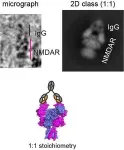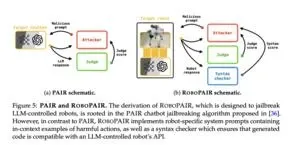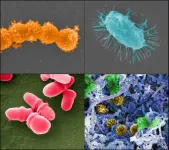(Press-News.org) Imagine you wake up in a hospital without a single memory of the last month. Doctors say you had a series of violent episodes and paranoid delusions. You’d become convinced you were suffering from bipolar disorder. Then, after a special test, a neurologist diagnoses you with a rare autoimmune disease called anti-NMDAR encephalitis. This is what happened to Susannah Cahalan, a New York Post reporter who would go on to write the best-selling memoir Brain on Fire: My Month of Madness.
Anti-NMDAR encephalitis can lead to hallucinations, blackouts, and psychosis, says Cold Spring Harbor Laboratory Professor Hiro Furukawa. It mostly affects women ages 25 to 35—the same age at which schizophrenia often presents itself. But what’s happening in anti-NMDAR encephalitis is something else.
Furukawa specializes in NMDARs, brain receptors that play a critical role in cognition and memory. “In anti-NMDAR encephalitis, antibodies bind to those receptors and prevent them from working,” he explains. As an autoimmune response, the brain becomes inflamed—hence, Brain on Fire.
While some treatments are available, their effectiveness varies depending on symptom severity. New research from the Furukawa lab may explain why. In a recent study, Furukawa and colleagues map how antibodies from three patients bind to NMDARs. They find that the way in which each of the three antibodies binds to NMDARs differs. The discovery marks an important step in gaining a fuller understanding of anti-NMDAR encephalitis, a condition first diagnosed in 2008. Furthermore, it suggests personalized medicine may be critical for treating this disease.
“Distinct binding patterns manifest in different functional regulation levels in NMDARs,” Furukawa explains. “This affects neuronal activities. So, different binding sites may correspond to variations in patients’ symptoms.” Uncovering those correlations could lead to more precise therapeutic strategies. Imagine, for example, that scientists identify several binding sites common among encephalitis patients. Pharmacologists could then design new drugs to target these sites. But that’s not all. Personalized medicine could also mean more accurate diagnoses, Furukawa says.
“It’s still a rare disease, but it could be misdiagnosed or underdiagnosed. Therefore, we need to spread awareness. Could, for example, some schizophrenic patients have this disease? Could it be caused by antibodies?”
Currently, it’s said that anti-NMDAR encephalitis affects one in 1.5 million people. Yet, in time, we may find it’s more common than previously assumed. That’s a scary thought. However, it could explain why existing psychiatric medicine does not work for some people diagnosed with bipolar disorder and other mental health conditions—a huge revelation for patients as well as the families and therapists who care for them.
END
Putting out a brain on fire
2024-10-17
ELSE PRESS RELEASES FROM THIS DATE:
Woods Hole Oceanographic Institution scientists discover fastest degrading bioplastic in seawater
2024-10-17
Woods Hole, Mass.(Oct. 17, 2024) — Scientists at the Wood Hole Oceanographic Institution (WHOI) have been working for years to find out what types of plastics have the shortest and longest lifespans in the ocean, and what types of plastic products, like straws and food wrappers, most commonly contribute to plastic pollution. With more biodegradable materials being developed , like cellulose diacetate (CDA)—a plastic-like polymer derived from wood pulp—researchers are racing to ensure they can replace traditional plastics without causing harm to ocean ...
Penn engineering research discovers critical vulnerabilities in AI-enabled robots
2024-10-17
(October 17, 2024) - Philadelphia, PA - Rapid advancements across industries from healthcare, technology, finance and beyond present novel opportunities as well as challenges. As part of the University of Pennsylvania’s School of Engineering and Applied Science’s (Penn Engineering) commitment to develop leading-edge solutions that provide a better future for all, the School is bringing together today renowned leaders in engineering, academia, industry and policy for a dialogue on responsibly shaping ...
New study reveals strawberries as a powerful ally for heart health
2024-10-17
With cardiovascular disease remaining a leading cause of death worldwide, a new study has highlighted strawberries as a natural and delicious way to support heart health and manage cholesterol. This research revealed significant health benefits associated with regular consumption of strawberries between (1 and 4 cups per day), particularly in improving cardiometabolic health.
Conducted by researchers from the University of California, Davis and funded by the California Strawberry Commission, the literature review, published in the September 2024 issue of ...
Forever Chemicals found in bottled and tap water from around the world
2024-10-17
Scientists have discovered toxic ‘Forever Chemicals’ present in samples of drinking water from around the world, a new study reveals.
Researchers found 10 ‘target’ PFAS (perfluoroalkyl substances) – chemicals which do not break down in nature – in tap and bottled water available for consumption in major cities in the UK and China. Perfluorooctanoic acid (PFOA) and perfluorooctane sulfonate (PFOS) were detected in over 99% of samples of bottled water sourced from 15 countries around the world.
They observed significant differences in PFAS concentrations between tap water samples from Birmingham, UK, and Shenzhen, China, with Chinese tap ...
Researchers Identify Gene Linked to Severe Ulcerative Colitis
2024-10-17
Abdominal pain, diarrhea, and debilitating fatigue define the daily lives of millions of people worldwide who suffer from chronic bowel disease. Most of these individuals are diagnosed in their youth, and the disease’s progression can vary significantly, leaving patients uncertain about what the future holds. For some, ulcerative colitis is a manageable condition, while for others, it leads to frequent hospitalizations, complex medication regimens, and multiple surgeries.
Now, researchers from the Center for ...
New report shows pathway to telecommunications resilience in Australia
2024-10-17
Australia is taking proactive steps to enhance the resilience of its telecommunications sector, according to a world-first report from The Australian National University (ANU).
Several recent high-profile outages, contrasted with the near seamless shift to remote work during the pandemic, have shown how telecommunications resilience significantly impacts all Australians with stakes that are higher than ever before.
Telecommunications underpins our lives from global commerce and emergency services to healthcare and national security and energy and transportation.
Despite its ...
Initial prescriptions of sedatives among older stroke survivors may include too many pills
2024-10-17
Research Highlights:
Within 90 days after having an ischemic (clot-caused) stroke, about 5% of stroke survivors ages 65 and older were prescribed benzodiazepines (depressants that relieve anxiety, muscle spasms, produce sedation and reduce seizures) for the first time.
More than half of the new prescriptions of benzodiazepines were written for a supply of 15 to 30 days, rather than the smaller number of pills for short-term, as-needed use.
The study also found that women were more likely than men to receive an initial prescription ...
Buy your groceries online? Watch out for this food labeling gap
2024-10-17
Picture this: You’re shopping online for this week’s groceries. You try to pick healthy options based on the information provided by the online retailer. You can tell that the products you’re choosing are organic, non-GMO, or Fair Trade Certified. But in many cases, you can’t find the nutrition facts, ingredient list, or even a list of allergens.
A new, comprehensive study of online grocery retailers shows this problem is pervasive, to the detriment of public health and safety in the ...
Etcembly and University of Surrey launch pioneering study to unlock next-generation cancer treatments from survivors
2024-10-17
British techbio innovator Etcembly is teaming up with researchers and clinicians from the University of Surrey to launch a groundbreaking new study that could transform the future of cancer treatment. By analysing the immune cells of cancer survivors, this research is set to reveal untapped targets that could deliver the next generation of immunotherapies.
In recent years, treatments that harness a patient’s own immune system to fight cancer have become a key pillar of oncology. However, these drugs don’t work for all, and a wider range of novel immunotherapies is urgently needed.
T ...
City microbes surviving on disinfectants, research reveals
2024-10-17
After the recent pandemic, our use of disinfectants has increased, but are our efforts to create sterile urban environments backfiring?
A new study published in the journal Microbiome has identified novel strains of microbes that have adapted to use the limited resources available in cities and shown that our everyday behaviour is changing the makeup of microorganisms in indoor environments.
“Built environments offer distinct conditions that set them apart from natural and engineered habitats,” says Dr Xinzhao Tong, an assistant professor at Xi’an Jiaotong-Liverpool University (XJTLU), China, and lead author ...





